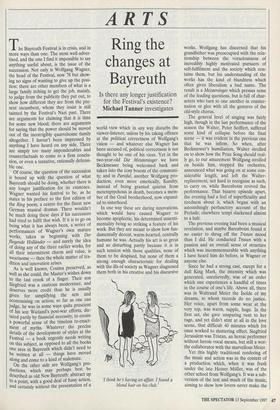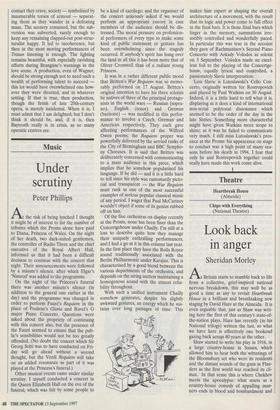ARTS
Ring the changes at Bayreuth
Is there any longer justification for the Festival's existence? Michael Tanner investigates
The Bayreuth Festival is in crisis, and in more ways than one. The most well-adver- tised, and the one I find it impossible to say anything useful about, is the issue of the succession. Not only is Wolfgang Wagner, the head of the Festival, now 78 but show- ing no signs of wanting to give up the posi- tion: there are other members of what is a large family itching to get the job, mainly, to judge from the publicity they put out, to show how different they are from the pre- sent incumbent, whom they insist is still tainted by the Festival's Nazi past. There are arguments for claiming that it is time for some new blood; there are arguments for saying that the power should be moved out of the incorrigibly quarrelsome family altogether. I haven't been impressed by anything I have heard on any side. There are simply too many imponderables and counterfactuals to come to a firm conclu- sion, or even a tentative, rationally defensi- ble one.
Of course, the question of the succession is bound up with the question of what Bayreuth should be doing, whether there is any longer justification for its existence. Wagner wanted his festival to be, as he states in his preface to the first edition of the Ring poem, a centre for the finest new German musical dramas. There wouldn't be much doing these days if his successors had tried to fulfil that wish. If it is to go on being what it has always been, a series of performances of Wagner's own mature works, taken as beginning with Der fliegende Hollander — and surely the idea of doing any of the three earlier works, for all their intermittent charm and value, is wearisome — then the whole matter of tra- dition and innovation arises. As is well known, Cosima preserved, as well as she could, the Master's wishes down to the last crook of a finger. Their son Siegfried was a cautious moderniser, and deserves more credit than he is usually given for simplifying the sets and economising on action; so far as one can judge, he was in some ways quite prescient of his son Wieland's post-war efforts, dic- tated partly by financial necessity, to create a powerful sense of the timeless re-enact- ment of myths. Whatever the precise details of the development of styles at the Festival — a book urgently needs writing on this subject, as opposed to all the books one sees in Bayreuth which didn't need to be written at all — things have moved along and come to a kind of stalemate. On the other side are Wolfgang's pro- ductions, which may perhaps best be described as old New Bayreuth: abstract up to a point, with a good deal of fussy action, and certainly without the presentation of a world view which in any way disturbs the viewer-listener, unless by his taking offence at the political correctness of Wolfgang's vision — and whatever else Wagner has been accused of, political correctness is not thought to be one of his vices. Yet in the two-year-old Die Meistersinger we have Beckmesser being welcomed back and taken into the cosy bosom of the communi- ty; and in Parsifal, another Wolfgang pro- duction, even more emetically, Kundry, instead of being granted quietus from metempsychosis in death, becomes a mem- ber of the Grail brotherhood, now expand- ed to sisterhood.
In one way these are daring innovations, which would have caused Wagner to become apoplectic, his determined unsenti- mentality being so striking a feature of his work. But they are meant to show how fun- damentally decent, warm-hearted, centrally humane he was. Actually his art is so great and so disturbing partly because it is in such tension with those qualities, none of them to be despised, but none of them a strong enough characteristic for dealing with the ills of society as Wagner diagnosed them both in his creative and his discursive `I think he's having an affair. I found a blond hair on his club.' works. Wolfgang has discerned that his grandfather was preoccupied with the rela- tionship between the voraciousness of incredibly highly motivated pursuers of self-fulfilment and the society which con- tains them, but his understanding of the works has the kind of blandness which often gives liberalism a bad name. The result is a Meistersinger which presses none of the leading questions, but is full of char- acters who turn to one another in conster- nation or glee with all the gestures of the old-style chorus.
The general level of singing was fairly high, though in the last performance of the season the Walter, Peter Seiffert, suffered some kind of collapse before the final scene — it was evident in the previous one that he was infirm. So when, after Beckmesser's humiliation, Walter strolled on to show how the Prize Song should real- ly go, to our amazement Wolfgang strolled on beside him, stopped the orchestra, announced what was going on at some con- siderable length, and left the Walter- replacement, not hard to recognise as such, to carry on, while Barenboim revived the performance. That bizarre episode apart, the evening had a feel of superficiality and tiredness about it, which began with an astonishingly perfunctory account of the Prelude; elsewhere tempi slackened almost to a halt.
The previous evening had been a musical revelation, and maybe Barenboim found it no easier to shrug off the Tristan mood than I did. He conducted Tristan with a passion and an overall sense of structure which was incommensurable with anything I have heard him do before, in Wagner or anyone else.
Since he had a strong cast, except for a dull King Mark, the intensity which was generated, unrelievedly, was of an order which one experiences a handful of times in the course of one's life. Above all, there was in Waltraud Meier the Isolde of my dreams, to whom records do no justice. Her voice, apart from some wear at the very top, was warm, supple, huge. In the first act, she gave unsparing vent to her rage, and yet didn't stint at all in the love scene, that difficult 40 minutes which for once worked to shattering effect. Siegfried Jerusalem was Tristan, an heroic performer without heroic vocal means, but still a wor- thy collaborator with the marvellous Meier.
Yet this highly traditional rendering of the music and action was in the context of a production which, when it was fresh under the late Heiner Muller, was of the other school from Wolfgang's. It was a sub- version of the text and much of the music, aiming to show how lovers never make the contact they crave, society — symbolised by innumerable torsos of armour — separat- ing them as they wander in a defeating maze. The scenery remained, but the sub- version was subverted, surely enough to keep any remaining clapped-out post-struc- turalist happy. It led to incoherence, but then in the most moving performances of Tristan listening is enough. The lighting remains beautiful, with especially ravishing effects during Brangane's warnings in the love scene. A production, even of Wagner, should be strong enough not to need such a wealth of performing talent to succeed this lot would have overwhelmed one how- ever they were directed, and in whatever setting. If that is true, then production, though the fetish of late 20th-century opera, is merely incidental. When it is, I must admit that I am delighted; but I don't think it should be, and, if it is, then Bayreuth really is in crisis, as so many operatic centres are.



































































 Previous page
Previous page